Mobile commerce is gaining momentum—more and more users are making purchases through mobile devices, primarily using mobile apps. The importance of this channel is no longer overlooked, as it was just a few years ago. On the contrary, many companies, especially in the services and apparel sectors, are now adopting a mobile-first strategy.
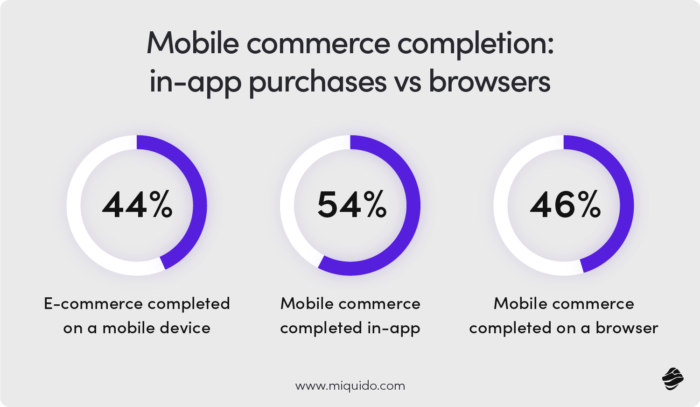
Focusing their efforts on mobile apps, they enhance their functionalities, user journeys, interfaces, and personalization methods. This shift is evident among many strong market players.
Just think of Shein and other giants in the apparel and accessories niche, or a large part of the travel and entertainment sector. Tui, Skyscanner, Itaka, Ikea, Rossmann, Douglas, Żabka—these are just a few examples from both Polish and international markets that support this argument.
In today’s article, we’ll break down the elements of a successful mobile commerce strategy through the lens of specific success stories. These will serve as a starting point for outlining effective and essential optimizations in mobile apps in today’s eCommerce landscape. Tap in and discover useful tips to improve your eCommerce software development and polish the mCommerce strategy.
Best mobile commerce strategies employed by leading brands – case studies
There’s no single recipe for success—but the companies you’ll read about below have found their perfect formula. The ingredients vary in each case, but every one of them could be applied to your business. The seasoning is always refined design, and the glue is reliable performance. These are, of course, crucial aspects you need to take care of, regardless of your niche. The rest is up to you!
You know many of these brands well. Each pays great attention to its online store and other digital sales channels—some even operate exclusively in this sphere. We’ll discuss not only the functionalities themselves but also entire marketing strategies and the approach to integrating mobile apps into the overall brand experience.
Duolingo: fast, engaging, and with character
First up—a game-changer in the education commerce niche, an app most mobile users are familiar with. It’s no coincidence—Duolingo has worked hard for it! Although also available in desktop and browser versions, the mobile app has always been its core strategy.
After all, the entire idea is rooted in learning a language anywhere, anytime—whether you’re waiting for the bus or between doctor’s appointments. Today, you hear the distinctive sound of a completed task in public spaces all the time, strengthening their mobile device marketing efforts.
Duolingo’s mobile app incorporates all the best design practices that we often write about. It’s efficient and engaging thanks to animations and thoughtful use of colors and details. It also has a well-thought-out onboarding process that allows for a quick yet accurate assessment of language proficiency and immediate immersion into learning. What else sets it apart?
Subscription mobile commerce strategy
The base version of Duolingo’s mobile app offers quite a lot to users. While the experience isn’t free of interruptions, they aren’t as intrusive as, for instance, in the free version of Spotify. Carrot over stick—this is the approach Duolingo chooses. By subscribing, you get personalized exercises and engagement-boosting perks with game-like elements: no life limits and unlimited challenge attempts.
Mascot and unconventional marketing
The distinctive mascot—a green owl—has always been an important element of the brand’s visual identity. Over time, its role has strengthened, and its presence has grown. All Duolingo learners are familiar with the push notifications featuring the owl and the famous widget, where the owl’s facial expression reflects your level of learning engagement.

The green owl is known for its guilt-tripping, which the Duolingo marketing team loves to joke about. The entire brand’s social media strategy is based on unhinged humor, trendjacking, and playing with relatable memes. And it works! This way, Duolingo maintains its status as a multigenerational app, teaching Gen Xers, millennials, Gen Zs, and even Alphas and strenghtening its leadersip in the linguistic mobile commerce world.
Apple’ mobile devices: the secret lies in confidence
Not everyone can afford a strong mobile commerce strategy like Apple’s. However, the famous brand maintains many best practices that could be useful for you too. Apple sends a clear message to the world: “We are confident in our products, and that’s what you should focus on.” They won’t dazzle you with eye-catching animations or branding—because their products are their pride.
Simple UI
The extremely simple UI of Apple’s mobile applications—Apple Store and App Store—stands out with its clean designs, large, readable fonts, and ample whitespaces. This isn’t always the best approach—sometimes a richer, more elaborate interface is worth considering. However, in this case, it perfectly aligns with the spirit of the brand.
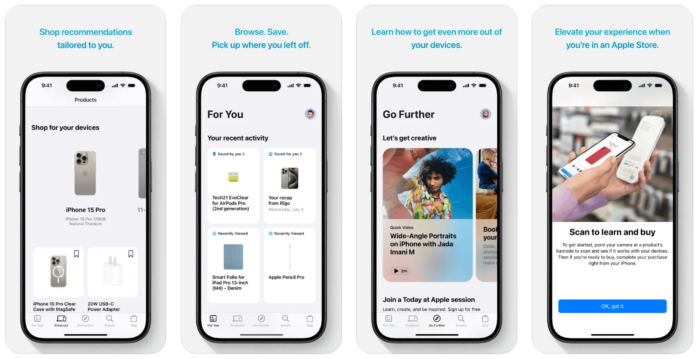
Skillful cross-selling
Across its channels, Apple seamlessly integrates services and products into a unified Apple experience, creating a sense of exclusivity. Users can access exclusive deals tied to Apple products, increasing their overall customer value. The consistent omnichannel experience Apple provides extends from online to on-site, with its distinctive physical stores aligning with the in-app experience through cohesive interior design and the overall atmosphere.
Herbalife: mCommerce strategy beyond the usual shopping experience
Herbalife’s application, Herbalife GO, one of the flagship projects in Miquido’s mCommerce application development portfolio, taught us many valuable lessons. The app was designed to go beyond the typical eCommerce solution. It was intended to offer added value to customers, aligning with the core mission of our client.
Features adding value for the customer
Instead of a standard shopping app, users received a solution that supports them in achieving weight and fitness goals. One of the app’s main features is fitness results monitoring. Users can also access a meal-planning feature, which incorporates the company’s products. Everything remains in an all-in-one app—based on these features, Herbalife gains access to valuable information to further cultivate user engagement and increase conversion. They become a non-invasive sales support strategy that brings additional value to users.
Sephora: mobile commerce strategy that makes You feel special
As a beauty company, Sephora understands better than anyone that making customers feel special is the key to building a strong brand-customer relationship. Their app focuses on personalization and making the shopping experience as close to the in-store experience as possible.
The simple, elegant interface, where the products, colors, and textures take center stage, plays a significant role in customer experience. There are also a few other elements actively contributing to its success.
App-only offers
Sephora plays it smart, knowing that the mobile app is a potential goldmine. It enables easy integration of built-in devices with AR eCommerce app features, precise and effective geolocation, and purchase motivation through push notifications. The app captures users on the go when shopping decisions are more impulsive. App-only offers are a great way to grow a base of mobile users who will stick with you for the long haul. Paired with seamless mobile payments, they contribute to customer experience.
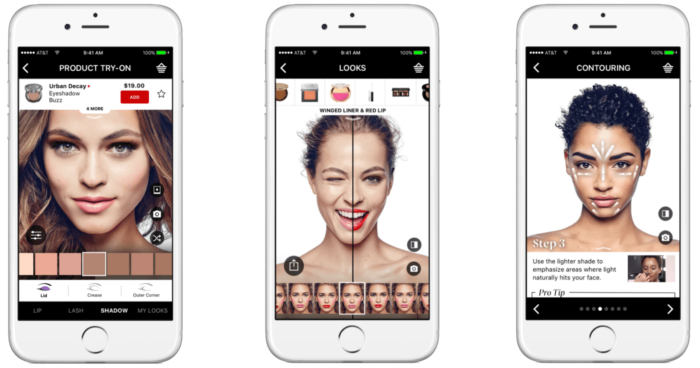
Virtual try-on (AR)
Sephora was one of the first beauty brands to recognize the potential of AR technology as a powerful purchasing incentive. Their AR solution, initially a standalone app and now a feature within the main app, allows users to virtually “try on” various makeup products in real-time. As a result, conversion rates increase, with purchases being completed immediately.
Personalized beauty feed
In its app, Sephora replicates the experience we know from social media platforms. Users can navigate through a personalized feed with tips and tutorials featuring their favourite cosmetics. Of course, the key to curating such a feed is data-driven personalization.
Summing up: Key Components of Effective Mobile Commerce Strategies
The examples above prove that there isn’t a one-size-fits-all formula for success. They show that being a pioneer and trying out strategies that aren’t yet established in the industry is worth the risk. AR in Sephora’s case, various AI functions in Herbalife, and gamification in Duolingo—these brands weren’t afraid to be different and have ultimately set new standards for the industry.
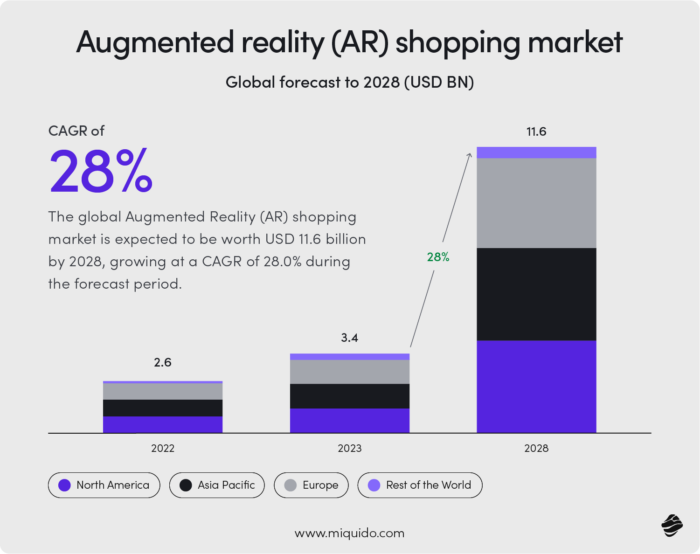
Many eCommerce companies focus on developing mobile commerce apps, recognizing that the number of people completing purchases on mobile phones is increasing, particularly in Asia, Africa, and South America. However, it’s essential not to overlook the optimization of online shops for mobile devices. For many users, the prospect of downloading an app equates to abandoning the purchase. A mobile website that’s not optimized for mobile device can severely undermine your conversion chances.
Developing cross-platform apps can help you ensure the best performance and equal experience throughout different channels while cutting costs of native development.
Best practices for personalizing the mobile shopping experience
Most big market players check all these boxes when it comes to optimizing mobile commerce. By following the tips below, you can significantly increase user loyalty and boost e-commerce sales on mobile platforms.
Create personalized loyalty programs
Tailor your loyalty rewards to match each user’s shopping habits and preferences on mobile devices. By integrating mobile payment options like Apple Pay or Google Pay, you not only deepen their connection to your brand but also encourage repeat purchases. Personalized programs are essential in driving customer retention and fostering long-term customer loyalty, which is a crucial element in mobile commerce trends.
Utilize AI-driven recommendations
Let AI do the heavy lifting by providing real-time, personalized product suggestions on mobile devices. This makes the mobile shopping journey more intuitive, increasing customer satisfaction and boosting conversions, especially in mobile commerce apps. The ability to offer tailored recommendations can also enhance the user experience on both mobile apps and mobile websites, further strengthening your m-commerce strategy.
Leverage dynamic content personalization
Transform your app experience by adjusting content and layouts in real time, based on user behavior and preferences. Leveraging location-based services on mobile platforms ensures that every interaction feels relevant and engaging. Personalizing the experience can drive more in-app purchases and mobile transactions, which are increasingly becoming the backbone of mobile commerce.
Enhance checkout with personalization and secure transactions
Simplify the checkout process by pre-filling information and offering preferred mobile payment options such as digital wallets, Apple Pay, or Google Pay. Consumers prefer a seamless and secure transaction experience, and adding relevant upsell items based on previous shopping behaviours can boost retail sales effortlessly. A personalized, simple checkout process on mobile devices is key to reducing cart abandonment and increasing e-commerce sales.
Send personalized push notifications
Forget the one-size-fits-all approach—use insights from past purchases and real-time behaviours to send personalized push notifications that resonate with your users. By prioritizing app development and creatively using push notifications, you can increase customer engagement and drive conversions. Push notifications should also provide easy access to the mobile store or direct links to relevant products, enhancing the overall mobile shopping experience.
In-app messaging for guidance
Offer personalized in-app messages that guide users throughout their shopping journey, providing support and recommendations precisely when they need them. This technique, combined with SMS marketing, is highly effective in mobile commerce environments. Such features also contribute to customer satisfaction by delivering timely information that enhances the user experience within mobile commerce apps.
Integrate seamlessly across channels
Build a consistent and personalized experience across all touchpoints—whether it’s on mobile devices, social media platforms, or even traditional e-commerce on desktop computers—to reinforce brand loyalty and drive conversions. A mobile commerce strategy that spans various touchpoints ensures a cohesive user experience, especially when engaging with potential customers who shop across multiple platforms.
Harness customer data
Dive into browsing history, purchase patterns, and user behavior to deliver tailored product recommendations and offers on mobile devices. Mobile marketing, driven by data from app store optimization and search engines, helps in targeting the right audience and increasing conversions. This level of personalization is crucial for mobile commerce success and enhances customer engagement, especially among smartphone users.
Incorporate a feedback loop
Regularly gather and analyze user feedback to fine-tune your personalization strategies. Keep this feedback loop in place to continuously refine your mobile commerce strategy. Consider customer feedback from various sources, whether it’s from app stores, online stores, or social commerce platforms. Incorporating these insights helps you better understand user behaviour, improve your app development, and ultimately enhance customer satisfaction and retention.
Implement a successful mobile commerce strategy with our support
Using our mobile app development services, you can create and deploy mobile apps inspired by the best practices listed above but fully in line with your business objectives. By understanding mobile commerce and the major trends in this area, we can grant you a competitive advantage and a long-term perspective of growth.
With our AI Kickstarter framework, you can incorporate AI in eCommerce three times faster than with traditional software development. Let’s discuss your needs, and who knows—maybe we’ll end up creating a dedicated mobile app!


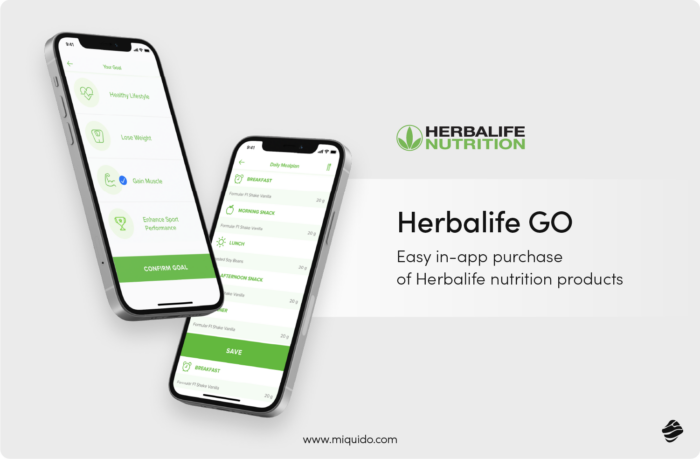



![[header] mobile app ui design tips for multiplying sales optimize your mobile commerce app](https://www.miquido.com/wp-content/uploads/2025/09/header-mobile-app-ui-design-tips-for-multiplying-sales_-optimize-your-mobile-commerce-app-432x288.jpg)

![[header] top ai use cases in ecommerce b2b from manufacturing to foodtech](https://www.miquido.com/wp-content/uploads/2025/09/header-top-ai-use-cases-in-ecommerce-b2b_-from-manufacturing-to-foodtech-432x288.jpg)

